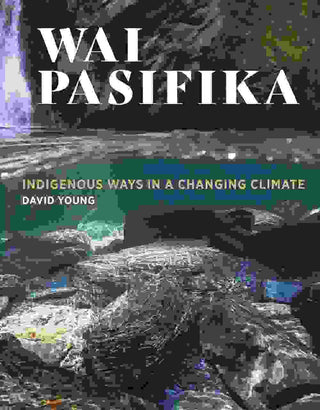Wai Pasifika : Indigenous Ways in a Changing Climate
- Unit price
- / per
-
Author:David Young
-
ISBN:9781990048074
-
Publication Date:October 2021
-
Edition:1
-
Pages:288
-
Binding:Paperback
-
Publisher:Otago University Press
-
Country of Publication:New Zealand


A Back Order button means that we don’t have the book in stock at our store. It may already be on order – or we can order it for you from a publisher or distributor at no additional cost.
As we source items from around the globe, a back-order can take anywhere from 5 days to several weeks to arrive, depending on the title.
To check how long this might take, you’re welcome to contact us and we can provide an ETA or any other information you need. We recommend checking the timeframe before committing to an online order.
Wai Pasifika : Indigenous Ways in a Changing Climate
- Unit price
- / per
-
Author:David Young
-
ISBN:9781990048074
-
Publication Date:October 2021
-
Edition:1
-
Pages:288
-
Binding:Paperback
-
Publisher:Otago University Press
-
Country of Publication:New Zealand
Description
In this beautifully written and stunningly illustrated book, David Young focuses on the increasingly endangered resource of freshwater, and what so-called developed societies can learn from the indigenous voices of the Pacific. Combining nineteenth century and indigenous sources with a selection of modern studies and his own personal encounters, Young keeps a human face on the key issue of water. He confirms that the gift of indigenous people to their colonisers is that they offer systematic and different concepts of being in, and experiencing, nature.
It is time people woke up to the dangers and began to embrace possible solutions, Young argues in this inspiring and deeply moving study. Current trends in water management are not only wasteful and destructive but also ultimately deadly.
He concludes, however, on a hopeful note, arguing that there is potential for change. The future rests on developing the discipline of deep respect for place, for planet and for life in its myriad forms.
Adding product to your cart
You may also like
A Back Order button means that we don’t have the book in stock at our store. It may already be on order – or we can order it for you from a publisher or distributor at no additional cost.
As we source items from around the globe, a back-order can take anywhere from 5 days to several weeks to arrive, depending on the title.
To check how long this might take, you’re welcome to contact us and we can provide an ETA or any other information you need. We recommend checking the timeframe before committing to an online order.
You may also like
You may also like
-
In this beautifully written and stunningly illustrated book, David Young focuses on the increasingly endangered resource of freshwater, and what so-called developed societies can learn from the indigenous voices of the Pacific. Combining nineteenth century and indigenous sources with a selection of modern studies and his own personal encounters, Young keeps a human face on the key issue of water. He confirms that the gift of indigenous people to their colonisers is that they offer systematic and different concepts of being in, and experiencing, nature.
It is time people woke up to the dangers and began to embrace possible solutions, Young argues in this inspiring and deeply moving study. Current trends in water management are not only wasteful and destructive but also ultimately deadly.
He concludes, however, on a hopeful note, arguing that there is potential for change. The future rests on developing the discipline of deep respect for place, for planet and for life in its myriad forms.
-
-
Author: David YoungISBN: 9781990048074Publication Date: October 2021Edition: 1Pages: 288Binding: PaperbackPublisher: Otago University PressCountry of Publication: New Zealand
In this beautifully written and stunningly illustrated book, David Young focuses on the increasingly endangered resource of freshwater, and what so-called developed societies can learn from the indigenous voices of the Pacific. Combining nineteenth century and indigenous sources with a selection of modern studies and his own personal encounters, Young keeps a human face on the key issue of water. He confirms that the gift of indigenous people to their colonisers is that they offer systematic and different concepts of being in, and experiencing, nature.
It is time people woke up to the dangers and began to embrace possible solutions, Young argues in this inspiring and deeply moving study. Current trends in water management are not only wasteful and destructive but also ultimately deadly.
He concludes, however, on a hopeful note, arguing that there is potential for change. The future rests on developing the discipline of deep respect for place, for planet and for life in its myriad forms.
-
Author: David YoungISBN: 9781990048074Publication Date: October 2021Edition: 1Pages: 288Binding: PaperbackPublisher: Otago University PressCountry of Publication: New Zealand
-



